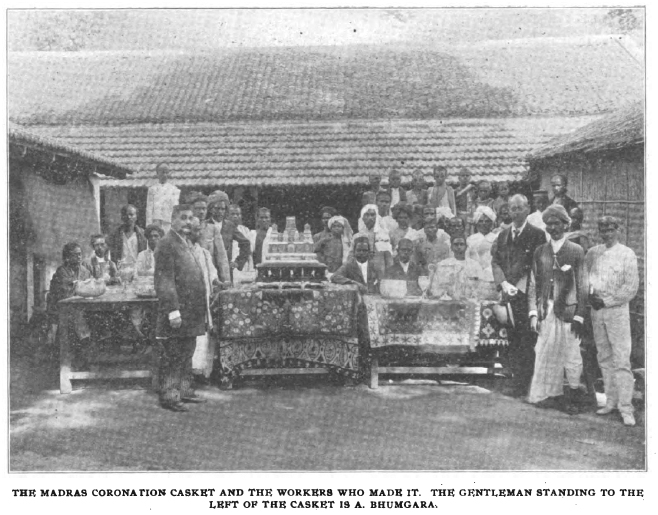Registered with the Registrar of Newspapers for India under R.N.I 53640/91
Vol XXXI No. 21, February 16-28, 2022
Chennai’s Old Curiosity Shop
by Karthik Bhatt
Mount Road in the late Nineteenth Century was home to quite an eclectic mix of businesses, ranging from a billiards table maker (John W. Roberts and Co) to a poultry farm (Arthurston Poultry Farm). One of the interesting businesses which functioned from No 5, Mount Road from the 1880s was the Parsee establishment of F.P. Bhumgara and Co, which specialised in Indian and Oriental artware. Unfortunately, its exact location cannot be traced today.
The origins of the firm dated to the 1840s, when it was founded by Framjee Pestoonjee Bhumgrah and his brother Sorabji in Surat. It initially dealt with sale of carved wooden boxes and other ivory articles. The business grew over the next couple of decades and by 1865, a branch had been opened in Bombay.

Following the opening of Suez Canal in 1869, Sorabji travelled to Europe to expand the trade and soon, the business was dealing with clients in places such as Alexandria, Paris, London and Cairo. It was probably one of the earliest attempts at marketing Indian artware in Europe and other parts of the West. Their first foreign branch was opened in London in 1890, followed by one in New York in 1894. Over this period, the firm also expanded across India, with branches being opened at Bangalore, Calcutta, Ooty, Darjeeling and Shimla. The branch in Madras was opened in 1880. Framjee Pestoonjee Bhumagra died soon after and the business was continued by his son Ardeshir Framjee Bhumgara in partnership with his cousin, Jamshedji Sorabji Bhumgrah.
In 1886, the firm was appointed special manufacturer of Indian silver, gold and other wares to Her Majesty, Queen Victoria. The commendation was received following the firm’s participation at the Indian and Colonial exhibition at London that year, where a mightily impressed Queen had bought several Indian curiosities.
A perusal of their catalogue from the 1890s reveals that the firm dealt with a wide variety of artwork from across the country such as Benares brass, carved ivory from Murshidabad, Kashmir shawls, mats from Palghat and Tirunelveli, the famous Swami silver and Rampur shawls. Its goods were displayed at various exhibitions both in India and abroad and won certificates, gold and silver medals.
In 1902, the firm received an order to make a casket to be presented by the city of Madras to King Edward VII on his coronation as the Emperor. The motif chosen for the occasion was the famous Pudhu Mandapam of Madurai. A description of the work in the American Carpet and Upholstery Journal (1902) makes for interesting reading. The entire piece was 20 inches in height, 17 inches in length and 8 inches in breadth and fully covered in silver. The casket was surmounted by three silver and gilt gopurams. On the principal panels in the front were images of Parvathi and Shiva on the Nandi and Lord Subramania on his vehicle, the peacock. Dwarapalakas flanked the doors on the front and the rear, with goddess Kali on a lion and Devi on a tiger finding representations on the back panel. Ganesha and Lord Shiva as Gowrishankara too were depicted. Running around the base of the structure was a scroll with depictions of Bhootaganas. The four corners of the structure had depictions of the yalis.
The plinth on which the casket stood was made of carved ebony, 27 inches by 15 inches by 5 ½ inches. There were six panels in front and an equal number behind, flanked by three panels on each side. These depicted various Gods such as Brahma, Indra, Venugopalaswamy, Rama and Krishna as Kalinga-Nartana and as Govardhanagiridhari. There were also representations of the Vaishnavite saints Manavala Mamunigal, Tirumangai Alwar and Ramanuja and the Saivite saints Appar, Sundarar and Thirugnanasambandar. The whole work was supported by eight winged horses. The entire work took six weeks to manufacture.
Ardeshir Framjee Bhumgara became an important member of the Parsee community in Madras. He was a part of the special committee setup to raise funds for the construction of the fire temple in Royapuram, which was inaugurated in 1910. In August 1906, he constructed the Framjee Hall in the compound of the Anjuman Bagh in the memory of his father. The inauguration of the hall was performed by yet another prominent member of the community in Madras, Hormusji Nowroji, Sanitary Engineer to the Government of Madras.
F.P. Bhumgara and Co continued to function in Madras until 1913 or so, when it was purchased by Asad Ali Khan Bahadur, Private Secretary to the Nawab of Banganapalli who later entered into business, establishing the firm of M.A. Ali and Brothers. Ardeshir however seems to have continued in the trade even a decade later, as a sole proprietor under the name of Ardeshir and Co with the office at Blacker’s Road, opposite Hotel D’ Angelis.

